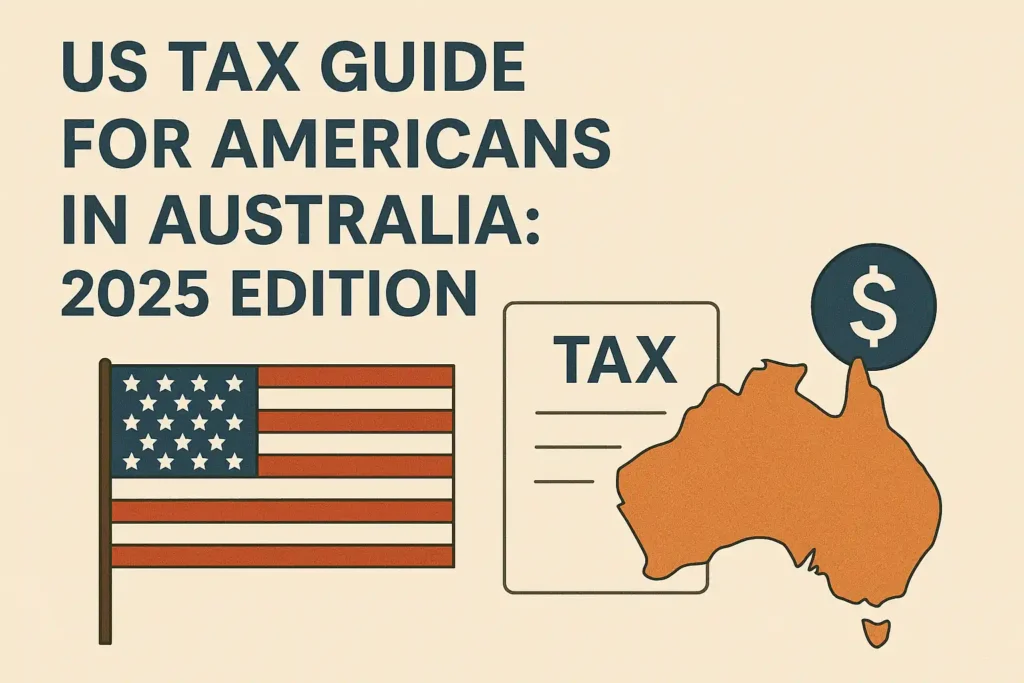Many U.S. expats living in Australia assume that moving abroad frees them from IRS obligations. After all, if you’ve been paying taxes to the Australian Taxation Office (ATO) for years, why would the United States still care? Unfortunately, that’s a common misconception.
The U.S. is one of only two countries in the world that taxes based on citizenship, not residency. This means that no matter where you live—even if you’ve been in Australia for decades—you must file a U.S. tax return each year if your income meets IRS thresholds.
If you’ve never filed since moving, this US tax guide for Americans in Australia will help you understand what’s required and how to get compliant without unnecessary penalties.
1. Do U.S. Expats in Australia Really Have to File?
Yes. As a U.S. citizen or green card holder, you must report worldwide income annually to the IRS, even if you:
- Haven’t lived in the U.S. for years
- Pay taxes in Australia already
- Earn only Australian-sourced income
The IRS expects you to file Form 1040, plus additional forms depending on your financial situation.
2. Filing Thresholds for 2025
The filing thresholds for expats are the same as for U.S. residents:
- Single: $14,600
- Married Filing Jointly: $29,200
- Self-Employed: $400 or more triggers filing, regardless of location
If your income meets these thresholds, you must file—even if all your earnings are already taxed in Australia.
3. How to Avoid Double Taxation
The good news is, filing doesn’t necessarily mean paying twice. The IRS offers tools to prevent double taxation:
- Foreign Earned Income Exclusion (FEIE) – Lets you exclude up to $126,500 (2025) of foreign income if you meet residence tests.
- Foreign Tax Credit (FTC) – Gives you dollar-for-dollar credit for income taxes paid to the ATO.
- Tax Treaty Benefits – The U.S.-Australia tax treaty helps clarify which country has taxing rights over different income types.
Most expats end up owing little to no U.S. tax once these benefits are applied.
4. What If You’ve Never Filed?
If you’ve lived in Australia for years and never filed, don’t panic. The IRS has programs designed for expats in your exact situation.
The most common is the Streamlined Filing Compliance Procedures:
- File the past 3 years of federal tax returns
- File the past 6 years of FBARs (if required)
- Self-certify that your failure to file was non-willful
This program eliminates penalties and helps expats get back on track without facing harsh consequences.
5. Additional Reporting Requirements
FBAR (FinCEN Form 114)
If your foreign bank accounts exceeded $10,000 at any time during the year, you must file an FBAR electronically.
FATCA (Form 8938)
If your foreign financial assets exceed certain thresholds ($200,000 for single expats living abroad), you must also file Form 8938.
6. Consequences of Ignoring U.S. Tax Filing
Not filing isn’t just risky—it can get expensive:
- Failure-to-file penalties from the IRS
- Loss of eligibility for streamlined programs
- Risk of passport issues under tax delinquency laws
- Higher future penalties if discovered during an audit
The longer you wait, the harder and more expensive it becomes to fix.
7. Practical Steps for Americans in Australia
Here’s a roadmap to getting compliant:
- Gather Records – Collect Australian tax returns, bank account details, and income information.
- Check Eligibility for Streamlined Amnesty – If you’ve never filed, this is often the safest option.
- Work With a Specialist – Choose a tax preparer familiar with US expat taxes in Australia.
- Plan Ahead – Understand how life changes (marriage, property sales, investments) impact both ATO and IRS filings.
FAQs: US Tax Guide for Americans in Australia
1. Do I still have to file if I only earn income in Australia?
Yes. U.S. citizens must report worldwide income, regardless of where it’s earned.
2. Can I claim taxes paid to the ATO on my U.S. return?
Yes, through the Foreign Tax Credit (FTC).
3. What happens if I’ve lived in Australia for 20 years and never filed?
You may qualify for the Streamlined Filing Program, which allows you to catch up penalty-free.
4. Do I need to report my Australian superannuation fund?
Yes, superannuation is often considered a foreign trust and may trigger additional reporting.
5. Will the IRS and ATO share information?
Yes. Under FATCA, Australian banks report U.S. account holders to the IRS.
Conclusion
For Americans in Australia, understanding your U.S. tax obligations is critical. Even if you’ve never filed, options exist to get back on track without facing severe penalties. By using the Foreign Earned Income Exclusion, Foreign Tax Credit, and programs like the Streamlined Filing Compliance Procedures, most expats can remain compliant without paying double tax.
If you’ve lived in Australia for years without filing, now is the time to act. The IRS has made it clear: they expect expats everywhere to stay compliant.




